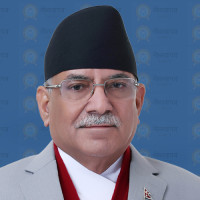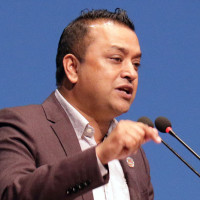- Tuesday, 3 March 2026
Momila's questions remain unanswered
Kathmandu, Apr. 11: Author Momila is in a
merry mood these days. She feels relieved when she gets a positive response for
her much-talked anthology of essays Prasna Haru Ta Baki Nai Rahanchhan (The
Questions Remain Unanswered) which has hit the bookstores of the capital,
recently.
She hears an unclear
buzz from the background that her language in the essays is a bit complicated.
On the other hand, other readers feel they have real lyrical flow. Professor of English literature Dr. Govinda
Raj Bhattarai finds the essayist unique in terms of her style.
“We find her trailing in the style of Devkota
and Lamichhane who write essays in an intuitive way,” he writes in his preface to
the book. Naveen Abhilashi from Nepalgunj wrote on his Facebook post, “Her
speech is poetic, her writing is rather poetic and her prose is equally poetic.”
“I am meditatively happy
these days. Both those who feel my writing complicated and those who feel it
highly articulative, make me happy. They release my happiness harmones,” she
said in an amusing tone.
A winner of many
awards, including Yuba Barsa Moti Puraskar, Momila is a professor of Nepali
literature. She is the conceiver and chairperson of Nepali Art and Literature Dot Com
Foundation as well.
As a professor and literary activist, she
seems to be a staunch nationalist.
At every activity of
the Foundation, we see a motto 'Mero Rastra, Mero Dhyeya' (My Nation, My
Attention). But as a poet and essayist, we find her totally anarchist. Her
characters violate every barrier and confinement of society. The so-called
norms and values of the society are just restraints for women, she asserts in
her essays.
“I am a creative
anarchist as an author, every author is anarchist to some extent,” she said.
As an author, she
walks along the way less travelled by others. Every piece she writes is
experimental. Ishwar Ko Adalat Ma Outsider Ko Bayan (An Outsider In the Court of
the God) was her celebrated essay. Under the same title, a collection of essays
by her was published five years back. It seemed she had translated herself as
Arthur Meursault, the protagonist of the famous novel The Stranger by Nobel Prize
winner Albert Camus. Popularly known as 'intellectual beauty' among her followers,
she in the above-mentioned essay presented herself as an outsider who is on
trial of the God in heaven.
The context seemed
similar to her own life story. She told out her struggle, her sacrifice for
love, realisation, dignity and her love for the truth before the God. She
remained consistent in her argument.
In Prasna Haru Ta
Baki Nai Rahanchhan, there is the second part of the same hypothetical essay
titled Ishwar Ko Adalat Bata Nirbasit Outsider (The Outsider Who Is Exiled from
the God's Court). In the latter, the God permits her to live in heaven where
she should not face any worldly toughness. But, gradually she is fed up with
the heavenly happiness. There is no struggle. No struggle, no satisfaction. She
loves the same fight for the existence, toughness, hues and cries, woes she was
facing in the world. She demands to return her to the world. And her demand is
fulfilled.
It is an artistic replica of her own life-story. Actually, her life struggle is a representative story of all the educated women of the third world who love dignity and self-esteem. Many words used in her essays are not found in the dictionary. You just have to work out the meaning yourself.
Moreover, the anthology published by Page Turner consists of 14 essays with lyrical language including Devkota Sanga Euta Sanjh Ko Kayantaran (Metamorphosis of an Evening with Great Poet Laxmi Prasad Devkota), Mrityu Saundarya (The Beauty of Death), Ek Pagal Ko Diary (Diary of a Lunatic), Merai Chhaya Ko Bidroh Ra Kayantaran (The Rebellion of My Own Shadow and the Metamorphosis) and so on. Likewise, there are nine short essays of spontaneous feelings under the title Sambedanharu.

















